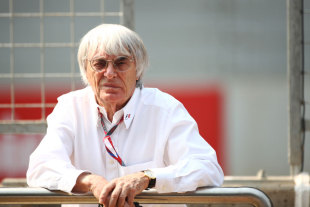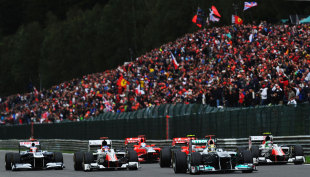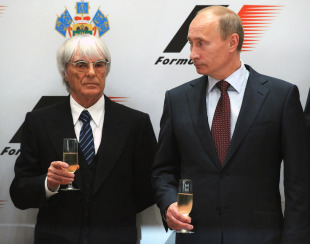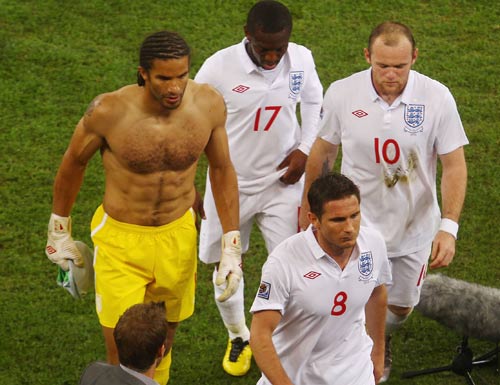
It was no surprise to hear Bernie Ecclestone announce this week that the number of grands prix in Europe would be restricted to five "in the next few years". Much like his threat to ditch the Monaco Grand Prix last year, which ultimately proved empty, it was a message to F1 circuits around the world, both current and prospective, that nowhere is sacred and anything is possible. It's unlikely that he'll act on his threat, and in a few years time no-one will remember anyway, but that probably wasn't the point.
Ecclestone knows the business of negotiating grands prix better than anyone else - and he ought to as he invented it. As the salesman, the key to getting the highest price for each event is to always have demand outweighing supply. Supply is relatively easy to control, although it appears to have reached its ceiling at 20 races in the last year, so Ecclestone has instead focused his attention on manipulating demand. It's a dangerous game calling Ecclestone's bluff, but saying that "Europe is a thing of the past" appears to be just another way of exerting his power over the market.
The current wrangling over the US Grand Prix is a perfect case study. The Circuit of the Americas (COTA) has been given a week to sign up to a contract that Bobby Epstien, one of the main investors in the circuit, has already labelled "unrealistic and unfeasible". In a brave attempt to meet him halfway, COTA sent Ecclestone what it considered to be a fair contract, but it's unlikely their peace offering got a second glance.
The truth is that it would be a huge loss to Ecclestone if the US Grand Prix does not go ahead next year, but he is a master poker player and in this instance he knows his hand is stronger than COTA's. With New Jersey lined up for 2013, he can give the impression that F1 can survive without Austin whereas the Circuit of the Americas' business model will face huge problems without F1. On December 7 we'll know who blinked first.
But while Ecclestone is busy manipulating his market for races, he has to keep an eye on the wider market for Formula One. It's all well and good having a grand prix in every corner of the globe, but the whole operation will go bust if no-one is watching. Europe is F1's traditional heartland and without it you lose a huge amount of the disposable income that sponsorship - F1's lifeblood - is targeted at.

Despite all its difficulties over recent years, Silverstone has continually attracted sell-out crowds, even when, in Ecclestone's words, the British Grand Prix was nothing more than a glorified "county fair". That support should be a strength when bargaining over future race deals, but as his comments this week have shown, Ecclestone eagerly turns it into a weakness. Although there is still huge demand for Formula One in Europe, that demand cannot generate the same levels of cash as a government seeking a new race to promote tourism in somewhere like Abu Dhabi or Singapore. The last thing a European government can be seen doing right now is giving money to a billionaire such as Ecclestone, so the new circuits can pay higher prices.
The only hope the European circuits have is to unite against Ecclestone with their fan power as a bargaining chip - in the same way the teams under FOTA do - but at the moment they are competing against each other. And by threatening to kick a few of venues off the calendar, Ecclestone heightens that competition and uses it to extract better terms with every contract renewal. He has the power and can then pick and choose between European venues while keeping one eye on the overall level of interest needed to keep sponsorship money rolling in.

That saturation could be enough to make future venues invest in an alternative, such as a football World Cup or Olympic Games, rather than a grand prix. So by saying a couple of European races could fall off the calendar, Ecclestone keeps potential venues interested with the prospect that they might replace one. Whether F1 actually goes to the new venues is not of immediate concern, the important thing is that he can go to F1's current circuits and negotiate even higher prices with the backing of that extra demand. In the end it filters back to the hard-working teams through their entitlement to 50% of F1's revenues and on the whole the sport is kept happy.
It's all a huge balancing act for Ecclestone - and one that he is very good at - but the main purpose is to strengthen his hand in negotiations while ensuring there is still sufficient global interest to keep sponsors in the sport. By maintaining the balance, Ecclestone can approach organisations such as the Circuit of the Americas with a stern poker face. Whether he's bluffing or not no longer matters as he has several well-positioned aces further up his sleeve.
Laurence Edmondson is an assistant editor on ESPNF1
© ESPN Sports Media Ltd.
 Laurence Edmondson is deputy editor of ESPNF1 Laurence Edmondson grew up on a Sunday afternoon diet of Ayrton Senna and Nigel Mansell and first stepped in the paddock as a Bridgestone competition finalist in 2005. He worked for ITV-F1 after graduating from university and has been ESPNF1's deputy editor since 2010
Laurence Edmondson is deputy editor of ESPNF1 Laurence Edmondson grew up on a Sunday afternoon diet of Ayrton Senna and Nigel Mansell and first stepped in the paddock as a Bridgestone competition finalist in 2005. He worked for ITV-F1 after graduating from university and has been ESPNF1's deputy editor since 2010

